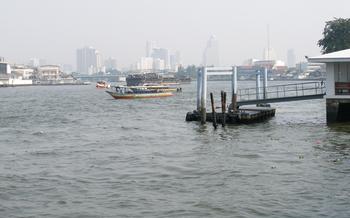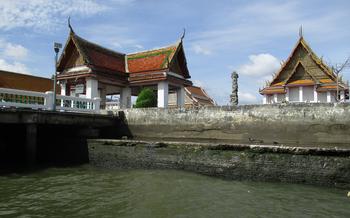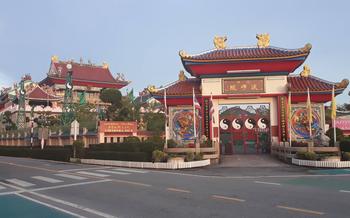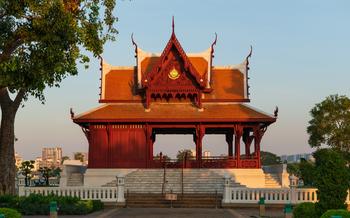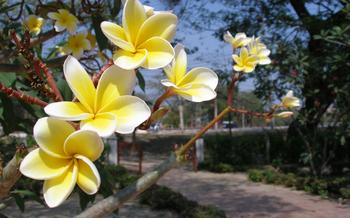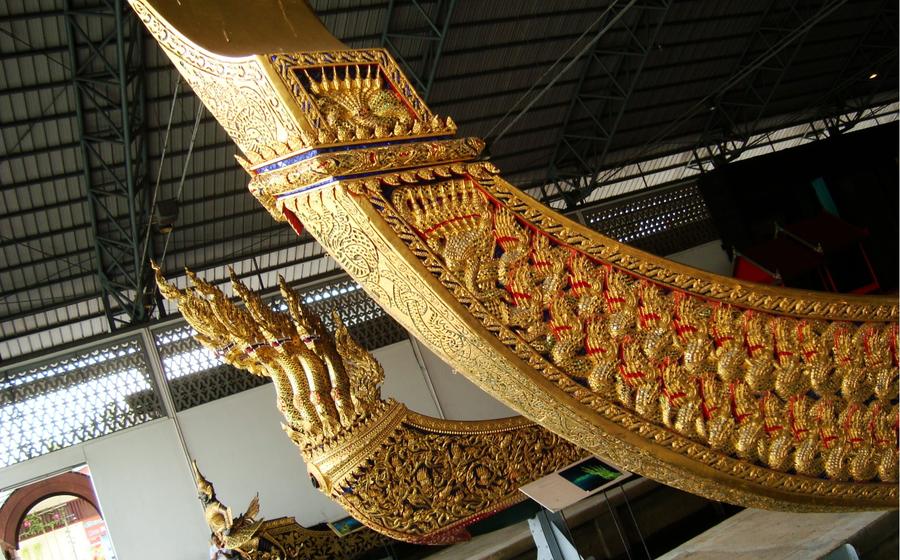
Bangkok Noi Museum
- Bangkok Noi Museum: A Hidden Gem in Thonburi
- Exploring the Museum's Diverse Collections
- Time Travel Through Thonburi's History
- Rediscovering Ancient Thai Crafts and Techniques
- Unveiling the Stories of Thonburi's Communities
- Art and Culture at the Museum
- The Museum's Educational Programs
- Museum Shop and Café
- Getting to the Bangkok Noi Museum
- Museum Hours and Admission Fees
- Planning Your Visit to the Museum
- Accessibility and Facilities for Visitors
- Sustainability and Environmental Initiatives
- Community Engagement and Outreach
- Insider Tip: Hidden Gems of the Museum
Bangkok Noi Museum: A Hidden Gem in Thonburi
Tucked away in the charming neighborhood of Bangkok Noi, on the west bank of the Chao Phraya River, lies a hidden gem that offers a glimpse into the rich history, culture, and traditions of Thonburi. The Bangkok Noi Museum, housed in a beautifully restored former rice warehouse, is a treasure trove of artifacts, exhibits, and stories that bring the past to life.
The museum's historical significance stems from its location in Thonburi, which was once the capital of Siam before Bangkok. Thonburi played a pivotal role in the kingdom's history, serving as a bustling trade and commerce center and a melting pot of diverse communities. The museum pays homage to this heritage by showcasing the unique aspects of Thonburi's past and its enduring legacy.
Unlike other museums in Bangkok that focus primarily on national or royal history, the Bangkok Noi Museum delves into the local stories and experiences of the Thonburi people. It celebrates the neighborhood's vibrant cultural identity, showcasing the contributions of ordinary individuals who shaped the community's fabric.
The museum attracts a diverse audience, including history enthusiasts, culture seekers, and local residents eager to reconnect with their roots. It serves as a gathering place for the community, hosting events, workshops, and exhibitions that promote cultural preservation and exchange.
Overall, the Bangkok Noi Museum exudes a warm and welcoming atmosphere, inviting visitors to step back in time and explore the hidden treasures of Thonburi's history and culture.
Exploring the Museum's Diverse Collections
Step into the Bangkok Noi Museum, and you'll be greeted by a treasure trove of artifacts and exhibits that tell the captivating story of Thonburi's past and present. From ancient pottery shards to intricate textile weavings, the museum showcases a wide range of objects that provide a glimpse into the region's rich history, culture, and traditions.
The museum's displays are thoughtfully curated to highlight the unique aspects of Thonburi's identity. Interactive displays and multimedia presentations bring the exhibits to life, allowing visitors to engage with the material in a dynamic and immersive way. Special exhibitions and temporary displays keep the museum's collection fresh and exciting, ensuring that there's always something new to discover.
Whether you're a history buff, a culture enthusiast, or simply curious about the stories that lie beneath the surface of Thonburi, the Bangkok Noi Museum offers a captivating journey through time and tradition.
Time Travel Through Thonburi's History
The Bangkok Noi Museum grants visitors a mesmerizing journey back in time, elucidating the remarkable transformation of Thonburi from a small riverside village into the vibrant metropolis it is today. Through captivating exhibits, historical maps, and poignant personal narratives, the museum unveils significant events, influential figures, and the industries that shaped Thonburi's unique identity. Visitors can delve into the chronicles of Thonburi's glorious past, gaining insights into its pivotal role as the capital of Siam during the Thonburi period. The museum's collection of vintage photographs, documents, and artifacts brings to life the stories of the people who lived, worked, and contributed to the city's rich history.
As you wander through the museum's halls, you'll encounter interactive displays that engage your senses and transport you to different eras of Thonburi's past. Experience the hustle and bustle of the bustling port, witness the construction of iconic landmarks, and learn about the industries that drove Thonburi's economic growth. Through these immersive exhibits, the museum unveils the hidden stories and forgotten heroes that have shaped the city's remarkable trajectory.
Rediscovering Ancient Thai Crafts and Techniques
Beyond its historical and cultural significance, the Bangkok Noi Museum also serves as a platform for preserving and promoting traditional Thai crafts and techniques. Thonburi has a rich history of craftsmanship, with skilled artisans specializing in intricate carvings, pottery, and textile weaving. The museum showcases these traditional crafts through a variety of exhibits and interactive displays.
Visitors can admire the delicate carvings on wooden furniture, religious objects, and decorative items. The museum also features a collection of traditional pottery, including glazed ceramics, stoneware, and earthenware. The intricate designs and patterns on these pieces reflect the creativity and skill of Thonburi's potters.
Textile weaving is another important craft highlighted at the museum. Visitors can learn about the different weaving techniques used in Thonburi, such as silk weaving, cotton weaving, and tapestry weaving. The museum displays a variety of woven textiles, including traditional garments, scarves, and household items.
To further immerse visitors in the world of traditional crafts, the museum conducts demonstrations and workshops led by local artisans. These workshops provide a hands-on opportunity to learn about the techniques and create your own crafts. Visitors can try their hand at carving, pottery, or weaving, and take home a unique souvenir of their experience.
The museum also supports local artisans by providing a platform to sell their handmade crafts. Visitors can purchase a variety of souvenirs and gifts inspired by the museum's collections, including pottery, carvings, textiles, and other handcrafted items. By supporting local artisans, visitors contribute to the preservation and promotion of traditional Thai crafts and help sustain the livelihoods of these skilled individuals.
Unveiling the Stories of Thonburi's Communities
Thonburi's rich history and diverse cultural heritage are vividly brought to life through the Bangkok Noi Museum's captivating exhibits on the communities that have shaped its identity. From the early settlements of the Mon people to the arrival of Chinese and Portuguese traders, each community has left an indelible mark on Thonburi's landscape and culture.
The museum showcases the unique customs, traditions, and festivals celebrated by these communities, highlighting their contributions to the city's vibrant tapestry. Visitors can learn about the significance of religious ceremonies, such as the Chinese Lunar New Year and the Mon Water Festival, and explore the diverse culinary traditions that have influenced Thonburi's cuisine.
Personal stories and experiences of local residents are interwoven throughout the exhibits, providing a glimpse into the lives of the people who have called Thonburi home. Through these narratives, visitors gain a deeper understanding of the challenges and triumphs faced by the communities that have shaped the city's past and present.
The Bangkok Noi Museum serves as a platform for cultural exchange and dialogue, fostering a sense of community pride and appreciation for the diverse heritage that makes Thonburi a truly unique destination.
Art and Culture at the Museum
The Bangkok Noi Museum is not just a repository of historical artifacts and cultural relics; it is also a vibrant hub of art and culture. The museum regularly hosts rotating art exhibitions showcasing the works of both local and international artists. These exhibitions provide a platform for emerging talents to showcase their creativity and for visitors to discover new artistic perspectives.
In addition to visual arts, the museum also hosts cultural performances and events throughout the year. These events celebrate the rich cultural heritage of Thonburi and provide visitors with an opportunity to experience traditional Thai music, dance, and theater. Visitors can witness the grace and elegance of classical Thai dance, the rhythmic beats of Thai music, and the captivating stories of Thai folklore.
To further promote cultural education, the museum offers workshops and classes on traditional arts, music, and dance. These workshops are conducted by experienced local artisans and performers who share their knowledge and skills with participants. Visitors can learn the intricacies of traditional Thai crafts such as carving, pottery, and textile weaving, or they can immerse themselves in the rhythmic movements of Thai dance or the melodies of Thai music.
The Bangkok Noi Museum serves as a creative space for local artists and performers to showcase their talents and connect with the community. By supporting and promoting local art and culture, the museum plays a vital role in preserving and celebrating the unique identity of Thonburi.
The Museum's Educational Programs
The Bangkok Noi Museum is dedicated to promoting education and learning about Thonburi's rich history and culture. It offers a range of educational programs tailored to students of all ages, providing interactive and engaging experiences that bring history to life.
Educational tours are conducted by knowledgeable guides who take students through the museum's exhibits, explaining the significance of artifacts and highlighting key historical events. These tours can be customized to suit the curriculum and learning objectives of each group.
Interactive learning experiences are incorporated throughout the museum, allowing students to explore history through hands-on activities. They can try their hand at traditional crafts, participate in quizzes and games, and even dress up in historical costumes.
The museum collaborates with schools and educational institutions to develop customized programs that align with their curricula. These programs can include workshops, field trips, and research opportunities for students.
The museum also provides resources for teachers and students, such as lesson plans, worksheets, and multimedia presentations. These resources can be used to supplement classroom teaching and enhance students' understanding of Thonburi's history and culture.
By offering a variety of educational programs, the Bangkok Noi Museum plays a crucial role in fostering a love of learning and preserving the cultural heritage of Thonburi for future generations.
Museum Shop and Café
After exploring the museum's fascinating exhibits, visitors can take a break and indulge in a delightful experience at the on-site museum shop and café. The museum shop is a treasure trove of unique souvenirs and gifts inspired by the museum's collections. Visitors can find intricately crafted local handicrafts, handpicked products made by talented artisans from Thonburi, and a selection of books on the history, culture, and traditions of the region.
The café, nestled within the museum's tranquil surroundings, offers a refreshing respite for weary travelers. Visitors can savor traditional Thai snacks and beverages, including sweet and savory treats, freshly brewed coffee, and thirst-quenching juices. The café also provides a relaxing spot to unwind after a thought-provoking journey through the museum's exhibits, allowing visitors to reflect on their experiences and soak in the serene atmosphere.
Getting to the Bangkok Noi Museum
The Bangkok Noi Museum is conveniently located in the Thonburi district of Bangkok, on the west bank of the Chao Phraya River. To get to the museum, you can take a variety of public transportation options. The nearest BTS Skytrain station is Bang Yi Khan, which is about a 15-minute walk from the museum. You can also take a bus or taxi from other parts of Bangkok. If you are driving, there is a parking lot available near the museum.
Once you arrive at the museum, you will be greeted by a friendly staff who can provide you with more information and directions. The museum is open from Tuesday to Sunday, from 9:00 AM to 5:00 PM. Admission fees are 100 baht for adults, 50 baht for children, and free for students with a valid student ID.
While you are in the area, be sure to visit some of the other attractions in Thonburi, such as the Wat Arun Temple, the Khlong Bang Luang Artist House, and the Thonburi Market. Thonburi is a vibrant and historic district with a lot to offer visitors, so make sure to take your time and explore all that it has to offer.
Museum Hours and Admission Fees
The Bangkok Noi Museum is open to the public from Tuesday to Sunday, from 9:00 AM to 5:00 PM. It is closed on Mondays and on public holidays.
Admission fees are as follows:
- Adults: 100 THB
- Children (3-12 years old): 50 THB
- Students (with valid ID): 50 THB
Discounts are available for groups of 10 or more. Online booking is available on the museum's website.
The museum also offers free admission to children under 3 and to senior citizens over 65 with a valid ID.
Admission fees contribute to the museum's operational costs and help support its educational programs and initiatives.
Planning Your Visit to the Museum
To make the most of your visit to the Bangkok Noi Museum, it's important to plan ahead and consider the following factors:
-
Recommended duration: Allocate at least 2-3 hours to thoroughly explore the museum's exhibits and collections. This will give you enough time to read the descriptions, watch the multimedia presentations, and engage with the interactive displays.
-
Best time to visit: Aim to visit the museum during weekdays or off-peak hours to avoid large crowds. This will allow you to have a more intimate and peaceful experience, especially if you're interested in taking photographs or asking questions to the museum staff.
-
Tips for making the most of your visit: Arrive at the museum early to avoid the midday heat and explore at your own pace. Bring a camera to capture the unique artifacts and exhibits. Wear comfortable shoes as you'll be doing a lot of walking. Take advantage of the free guided tours offered by the museum to gain insights from knowledgeable docents.
-
Suggested itineraries: Combine your visit to the Bangkok Noi Museum with other nearby attractions to create a fulfilling day trip. Start by exploring the Thonburi canals, taking a boat ride to see the historic temples and houses along the river. After visiting the museum, head to the nearby Pak Khlong Talat flower market or the Khlong San Market for a vibrant shopping experience.
Accessibility and Facilities for Visitors
The Bangkok Noi Museum welcomes visitors from all backgrounds and abilities, ensuring an inclusive and accessible experience for everyone. Wheelchair accessibility is a priority, with ramps and elevators providing easy access to all floors of the museum. Designated parking spaces are available for visitors with disabilities, located conveniently near the museum entrance.
Family-friendly facilities are also available, making the museum an enjoyable destination for families with young children. Strollers and diaper-changing rooms are provided for convenience, allowing parents to navigate the museum comfortably. Guided tours and audio guides are offered in multiple languages, catering to international visitors and those who prefer a more immersive experience.
For added convenience, lockers and storage facilities are available for visitors to store their belongings while exploring the museum. This allows visitors to fully immerse themselves in the exhibits without the hassle of carrying bags or belongings.
Sustainability and Environmental Initiatives
The Bangkok Noi Museum is committed to sustainable practices and environmental protection. The museum utilizes renewable energy sources, such as solar panels, to power its operations and reduce its carbon footprint. Eco-friendly materials are incorporated into the museum's construction and maintenance, minimizing its environmental impact.
The museum actively promotes waste reduction and recycling programs, encouraging visitors to adopt sustainable practices during their visit. Recycling bins are strategically placed throughout the museum, and visitors are encouraged to sort their waste accordingly. The museum also collaborates with local recycling organizations to ensure proper waste management.
By embracing sustainability, the Bangkok Noi Museum sets an example for other cultural institutions in Thailand and promotes responsible tourism. It demonstrates that museums can play a vital role in protecting the environment while preserving and showcasing cultural heritage.
Community Engagement and Outreach
The Bangkok Noi Museum is deeply rooted in the community and plays an essential role in preserving and promoting local culture. The museum collaborates closely with local communities and organizations to host a variety of events, workshops, and festivals that celebrate Thonburi's rich heritage. These events provide a platform for local artists, performers, and artisans to showcase their talents, share their stories, and connect with visitors.
The museum also actively participates in community outreach programs, working with schools and educational institutions to bring history and culture to life for students of all ages. Interactive learning experiences, guided tours, and educational resources make the museum an invaluable resource for teachers and students alike.
Through its community engagement initiatives, the Bangkok Noi Museum contributes to the preservation and revitalization of Thonburi's cultural identity, ensuring that the stories and traditions of this vibrant district continue to be shared for generations to come.
Insider Tip: Hidden Gems of the Museum
Beyond the main galleries and exhibits, the Bangkok Noi Museum holds a few hidden gems that are waiting to be discovered by curious visitors. One such gem is the rooftop terrace, which offers stunning panoramic views of Thonburi and the Chao Phraya River. Take a moment to soak in the beauty of the cityscape and enjoy the gentle breeze while you contemplate the museum's collections.
Another hidden gem is the museum's library, which houses a rare and extensive collection of books, manuscripts, and documents related to Thonburi's history and culture. If you're a history buff or a researcher, this library is a treasure trove of information that will transport you back to the past.
Finally, keep an eye out for special events and exhibitions that the museum organizes throughout the year. These events often showcase unique artifacts, performances, and workshops that provide a deeper dive into Thonburi's heritage. Check the museum's website or social media pages for upcoming events and plan your visit accordingly.
